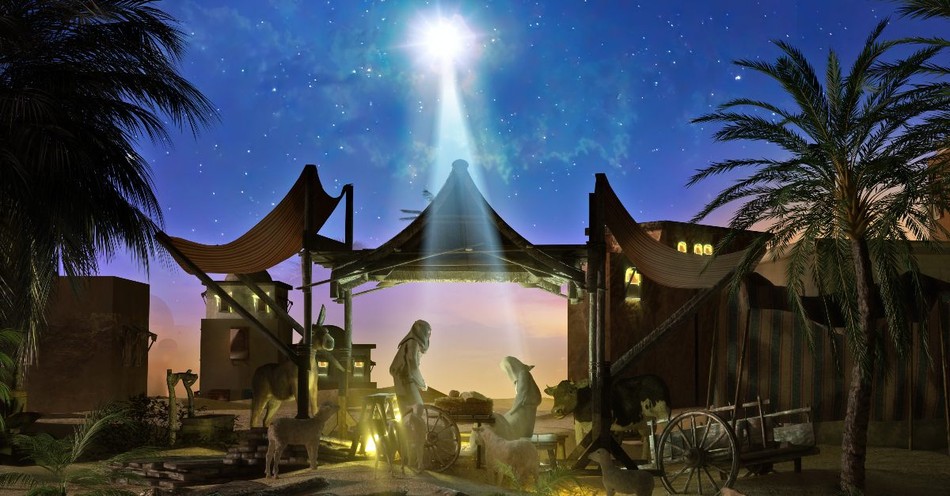Christmas advent calendars, manger scenes, and paintings of Mary depict her as being a young woman in her mid-twenties when she gave birth to the Lord Jesus Christ. While these depictions are beautiful to look at, they are not biblically correct. Mary was likely to have been younger than twenty when she gave birth to Jesus. Most Christian historians believe Mary was between 15 and 16 years old when Jesus was born.
How Old Was Mary When Jesus Was Born?
The Bible does not tell us exactly how old Mary was when she gave birth to Jesus, however many historians use clues in Scripture to estimate Mary's age to be around 15 years-old when she had Jesus.
From the Bible, we do know Mary would have been a young virgin when she had Jesus. The Gospel of Matthew tells us, “This is how the birth of Jesus the Messiah came about: His mother Mary was pledged to be married to Joseph, but before they came together, she was found to be pregnant through the Holy Spirit” (Matthew 1:18).
In this passage of Scripture, we are not told Mary’s age, yet we are told she was a virgin and was pledged to be married to Joseph. During this time in history, Jewish girls would have been betrothed (engaged) to their husbands as early as the age of 12 years old. Scholars believe Mary would have been somewhere between 12-16 years old when she had Jesus.
Given the biblical account and the Jewish cultural practices in Mary’s day, the most plausible age Mary would have been when she had Jesus was most likely 15 or 16 years old. It is believed that Mary would have been about 14 years old when Gabriel gave her the news of the Lord being born to her.
Women normally carry babies in their wombs for about nine months, and depending on when Mary’s birthday was in the year, it could be she was nearing 15 or 16 years old when she gave birth to Jesus. While the Bible does not tell us specifically how old Mary was, we can rightly deduce she was a young lady when she gave birth to Jesus.
The Bible does not tell us the exact age of Mary because Mary is not the focus of the account —Jesus is the focus. Many people, such as the Catholic religion, have elevated Mary to a status that she is not. Mary was a human being just like the rest of us and was in need of the Savior (Romans 3:23).
She was not sinless as Mary recognized her own need for the Savior to save her from her sins (Luke 1:46-49). A person should not pray to Mary or worship her. Mary is not God, and she does not work as a mediator between us and the Father.
Jesus is our only mediator, as Paul tells us, “For there is one God and one mediator between God and mankind, the man Christ Jesus” (1 Timothy 2:5). In the same way, Hebrews speaks about Jesus as our mediator, “Therefore he is able to save completely those who come to God through him, because he always lives to intercede for them” (7:25).
Mary was an important factor in God’s plan to save humanity; however, she was a servant of the Lord — she was not the Lord herself. Jesus is our Savior and Lord, who deserves all of our praise, glory, and worship (Hebrews 1:6-8).
There is much we can learn from Mary’s life as a young girl. As previously mentioned, Mary would have most likely been somewhere between 15 and 16 years old when she gave birth to Jesus. In other words, Mary would have been a teenager.
Mary's Mature Faith and the Angel's Message
Despite her youth, Mary showed a great sense of faith and maturity by carrying the Son of God in her womb. Teenagers today are preoccupied with social media, trends, and celebrities. Mary was focused on the Lord and serving Him with all her heart. The Holy Spirit provided the means for Jesus to be conceived even though Mary was a virgin (Luke 1:29-38).
Despite the fact that Mary had not been unfaithful to Joseph, to see Mary pregnant would have raised suspicious glances and ridicule from the other people in town. Mary would have known this when she accepted the responsibility of carrying the Lord in her womb. She did not question Gabriel or try to run away from God’s plan for her life.
Mary demonstrates great faith in God when she tells Gabriel, “I am the Lord’s servant … May your word to me be fulfilled” (Luke 1:38). Rather than viewing this responsibility as a burden, Mary saw carrying the Lord as a great privilege and honor. It would have been scary for Mary; however, she chose to be brave, bold, and trust in the Lord.
In the same way, Joseph shows great bravery, loyalty, and faith in his own actions, which often go unnoticed by biblical scholars. As soon as Joseph heard the news of Mary being pregnant, feelings of betrayal, pain, and anguish would have flooded Joseph’s heart.
By all practical means, the first assumption of anyone would have been that Mary had been unfaithful to Joseph. It would have been difficult to believe your engaged wife was pregnant by the work of God’s hand.
He had in mind to divorce her privately; however, an angel of the Lord told him, “Joseph son of David, do not be afraid to take Mary home as your wife, because what is conceived in her is from the Holy Spirit. She will give birth to a son, and you are to give him the name Jesus because he will save his people from their sins” (Matthew 1:20-21).
The angel of the Lord who visited Joseph in a dream affirmed to him that Mary had not been unfaithful to Joseph as she was the virgin spoken of by the Old Testament prophets, who would give birth to the Messiah (Isaiah 7:14; Matthew 1:20-25).
Even before Joseph was informed in a dream by the angel that Mary indeed had not been unfaithful to him, he was going to divorce her privately. During this cultural time in Palestine, if Joseph had told the Jewish leaders that Mary had been unfaithful to Him during their engagement, Mary could have been stoned or even killed.
Joseph's action of divorcing her privately would not have saved Mary from public ridicule, but it would have saved her life. This fact is often overlooked when readers read the account of Mary’s pregnancy and the birth of Jesus. Joseph extended great kindness, mercy, and faith in his actions.
We do not know how old Joseph would have been when Jesus was born; however, Jewish customs during this time normally had Jewish boys to be married in their mid or late teens, yet they could have married older than later teen years for a myriad of reasons.
Importance of Mary's Age at the Birth of Christ
The ages of Mary and Joseph are aspects of the Christmas story; however, the true importance of the Christmas story is Jesus’ birth into the world. Jesus’ birth signified God was with the people, and He had come to save humanity from our sins.
During this Christmas season, may we all rejoice and celebrate the glorious birth of our great God and Savior, Jesus Christ, just like Mary and Joseph did on the night Jesus was born.
For further reading:
Why Did God Choose Mary to Be the Mother of Jesus?
Who Was Mary the Mother of Jesus?
What Is the Significance of Mary’s Song at Christmas?
Did Mary and Joseph Really Stay in a Cave?
Photo Credit: ©iStock/Getty Images Plus/Denis-Art

This article is part of our larger Christmas and Advent resource library centered around the events leading up to the birth of Jesus Christ. We hope these articles help you understand the meaning and story behind important Christian holidays and dates and encourage you as you take time to reflect on all that God has done for us through His Son, Jesus Christ!
What Is Advent: Meaning, History, and Traditions
Advent Prayers for Friends, Family, and More
What Is an Advent Wreath and How to Use One?
The History of Santa Claus: Origin of St. Nicholas
Christmas Bible Verses & Scripture Story
What is Christmas? True Meaning and Holiday History
Christmas Eve History and Traditions
Why Gold, Frankincense, and Myrrh?
When Was Jesus Born? Why December 25th
Where Was Jesus Born?



